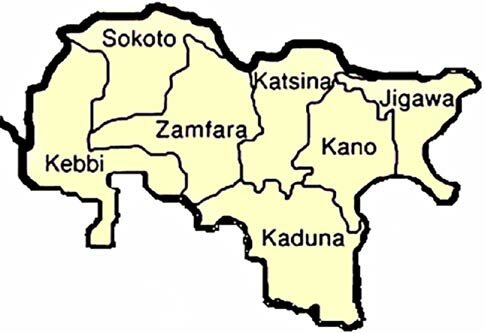The establishment of the NWDC presents an opportunity to address the profound developmental challenges in the region and harness its untapped resources. If executed properly, the NWDC’s strategy could unlock significant economic growth, transform the lives of its citizens, and position the region as a key player in Nigeria’s national development.
At present, the North West Region, which includes Kano, Kaduna, Katsina, Sokoto, Kebbi, and Zamfara, is grappling with several socio-economic challenges. With a population of approximately 75 million people, it accounts for about 20 per cent of Nigeria’s total GDP. However, the region’s per capita income remains low, averaging around $2,300, compared to the national average of $5,000. This gap reflects the region’s underdevelopment across critical sectors, with education standing out as one of the most significant challenges.
The education system in the North West is in a dire state. Literacy rates are around 58 per cent, well below the national average of 62 per cent. However, literacy in this region does not solely align with Western education. The region is dominated by Islamic teachings, and a significant portion of the population views literacy through the lens of Islamic education. Islam governs many aspects of life here, from social systems to financial structures, which influences the region’s outlook on learning and development.
The almajiri schooling system, which is widespread, must be remodelled to include technical and vocational training. This approach would equip the youth and adults within the system with practical skills that not only contribute to the region’s economic growth but also allow them to develop personally and professionally. By attaching technical training to the almajiri system, the NWDC can significantly reduce youth unemployment, currently at 25 per cent, while fostering a more self-reliant population.
- Hardship: It’s time to review your policies, PDP BoT tells Tinubu
- Plus Wallet Redefines Crypto Management with its Fast Listings & Rewards System While WallitIQ & Token Unlocks Shake Up The Market
Financial literacy and economic development in the region must also account for the Islamic financial framework that is deeply ingrained in the region’s socioeconomic fabric. Non-interest financial institutions, Islamic banking, and financial instruments such as Takaful (Islamic insurance) and Sukuk bonds (Islamic bonds) are widely accepted in the North West because they adhere to Islamic teachings. Islamic banking, in particular, has seen significant growth as it aligns with the region’s preference for Sharia-compliant financial practices, offering alternatives to traditional Western banking models.
The NWDC could leverage these systems to introduce innovative financial products and attract more investments into the region, while ensuring alignment with local values.
In addition to education and finance, the region suffers from significant infrastructure deficits. Only 40 per cent of the road network is paved, hindering efficient transportation and trade, while access to electricity is limited to about 35 per cent of the population. Frequent power outages impede industrial growth and limit economic activities. To mitigate these issues, the NWDC must invest heavily in road infrastructure, renewable energy projects, and the expansion of electricity networks. If these gaps are closed, the region could see a 30 per cent increase in productivity across key sectors, enabling faster movement of goods and reducing costs for businesses.
Agriculture remains the backbone of the region’s economy, contributing about 25 per cent to regional GDP. However, the sector operates largely on a subsistence level, characterised by inadequate irrigation, limited access to quality seeds, and outdated farming techniques.
The NWDC’s strategy, according to documents on its establishment, includes a $300 million investment in modern farming techniques, irrigation systems, and agribusinesses. The introduction of drip irrigation, mechanised farming, and access to high-yield seeds is projected to boost agricultural productivity by 40 per cent. The creation of value-added processing industries will not only increase the shelf life of produce but also generate new revenue streams. This could increase agriculture’s contribution to the region’s GDP from 25 per cent to 35 per cent, making the North West a critical player in Nigeria’s food security.
The establishment of a centralised Trading Company under the NWDC is another innovative approach to tackling food security and commodity trading. This entity would manage the procurement, distribution, and marketing of essential commodities, ensuring stable supply chains and competitive pricing. The Trading Company is projected to reduce post-harvest losses by 30 per cent and stabilise food prices for over 50 million residents. Moreover, by tapping into international markets, the region could increase export revenues by 25 per cent, particularly in agricultural products and mineral resources.
The mining sector also presents a significant opportunity for the region. Rich in natural resources like gold, limestone, and tantalite, the North West remains underexploited due to regulatory barriers and insufficient investment. The NWDC’s plan to invest $200 million in mining infrastructure and regulatory reforms could attract domestic and foreign investors, increasing mineral exports by 50 per cent. By developing the mining sector, the region can diversify its economy and reduce its dependency on agriculture, contributing to long-term economic resilience.
A notable initiative of the NWDC is its focus on the Halal meat market. With global demand for Halal-certified products on the rise, the North West Region is well positioned to become a leading supplier of Halal meat to international markets. The NWDC’s strategy includes the establishment of standardized processing facilities and strict compliance with international Halal standards. This initiative is expected to increase meat exports by 30 per cent, tapping into lucrative markets in the Middle East and other regions with high demand for Halal products. This will not only diversify the regional economy but also create jobs and boost local economies.
Investment in technology is another critical aspect of the NWDC’s strategic framework. The commission plans to allocate $500 million over the next decade to establish technology parks and innovation hubs across the region. These centres will support startups, facilitate research and development, and promote the adoption of digital technologies in traditional sectors like agriculture and mining.
Continue on www.dailytrust.com
Expanding high-speed internet to 70 per cent of the population will further bolster e-commerce activities, potentially increasing online trade volumes by 150 per cent and creating over 100,000 jobs in the digital economy. Additionally, the NWDC recognises the potential of renewable energy and recycling. By investing in solar energy farms and waste-to-energy projects, the commission can provide sustainable energy solutions while addressing environmental concerns. Integrating refugees into these projects, particularly those displaced by conflicts in neighboring regions, offers a dual solution of improving energy access and providing employment opportunities to vulnerable populations. This approach is projected to increase renewable energy capacity by 20%, reduce energy costs, and support the region’s long-term energy security.
The NWDC’s strategic framework also emphasises the importance of Public Private Partnerships (PPPs) in driving development. By collaborating with local and international private enterprises, the commission can accelerate infrastructure development, enhance service delivery, and foster a culture of entrepreneurship. Developmental finance from institutions such as the Islamic Development Bank (IDB) and the Development Bank of Nigeria (DBN) is crucial for funding large-scale projects. The NWDC has already secured commitments of $1 billion in developmental funds, which will be allocated towards infrastructure, education, technology, and agricultural projects. If the NWDC successfully implements its strategy, the North West Region could experience a significant economic transformation.
The region’s GDP, currently around $150 billion, could double to $300 billion by 2034. Employment opportunities could rise from the current 15 million to over 25 million, driven by growth in key sectors like agriculture, mining, technology, and e-commerce. Education reforms and the expansion of technical schools will produce a skilled workforce capable of driving innovation, while infrastructure improvements will enhance trade efficiency and attract investment.
The Halal meat market, agricultural development, and mining expansion will position the North West as a key player in Nigeria’s economic diversification strategy. Moreover, the focus on sustainability, renewable energy, and community engagement will ensure that growth is inclusive and environmentally responsible.
To ensure the success of this ambitious vision, the NWDC must prioritise good governance and accountability. Robust monitoring and evaluation frameworks are essential to track progress, ensure transparency, and mitigate corruption. Additionally, community engagement will be crucial in ensuring that development projects address local needs and promote social cohesion. In conclusion, the constitution of the North West Development Commission presents a historic opportunity to transform the Northwestern Region into an economic powerhouse.
By addressing critical sectors like education, agriculture, technology, and trade, the NWDC can harness the region’s full potential and contribute significantly to Nigeria’s emergence as a leading economy in Africa. With strong leadership, strategic investments, and collaborative partnerships, the North West can rise to become a model of sustainable development, improving the lives of millions and setting the stage for a brighter future.

 Join Daily Trust WhatsApp Community For Quick Access To News and Happenings Around You.
Join Daily Trust WhatsApp Community For Quick Access To News and Happenings Around You.


